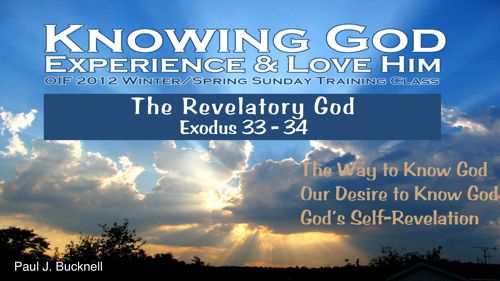
Knowing God: Experience & Love Him
The Revelatory God (Exodus 33-34)
Paul J. Bucknell
Way to Know God | God's Facebook | Purpose of Life | Distortion of Good Works | Spiritual Development | Desire to Know God | Call Upon | Exodus 34:6-7 | God's Character | God and Religions
Chapter #2 The Revelatory God: Handout pdf | Video
For pdf | epub | ppt | Audio mp3, check out the D3 Library
Knowing God Series Index
Series Introduction| Knowing God | The Revelatory God | Goodness of God | Holiness of God | Power of God | Omnipresent God | Exalted God | Faithfuness of God | Wisdom of God | Mercy of God | Wrath of God | Love of God | Sovereignty of God | Providence of God
Our Desire to Know God (Exodus 33)
Purpose: A careful study of Exodus 33:12-13 gives us a great example of how our communication and prayer can be with God, that is, frank, involved and urging.
Around 1500 BC, God revealed Himself to one He could trust, Moses. He was making Himself known to His people (Moses would write it down to be communicated to all of us).
How could He trust Moses? Read Exodus 33 carefully and see if you can discern what God is looking for by answering the questions below.
“Then Moses said to the LORD, “See, Thou dost say to me, ‘Bring up this people!’ But Thou Thyself hast not let me know whom Thou wilt send with me. Moreover, Thou hast said, ‘I have known you by name, and you have also found favor in My sight.’ Now therefore, I pray Thee, if I have found favor in Thy sight, let me know Thy ways, that I may know Thee, so that I may find favor in Thy sight. Consider too, that this nation is Thy people” (Exodus 33:12-13).
-
What did God want of Moses?
-
What did Moses want?
-
What was he frustrated about?
-
What did Moses think the solution was?
Meaningful communication
Be careful to observe what is happening here. Exodus 33-34 gives us great insight to what made Moses the most humble person on the earth (Numbers 12:3). Moses is dialoging with God. God’s person is being reflected here in this conversation. God even allows Moses to go on speaking about his own troubles. This is very different than most people think about God.
This pattern of communication should also happen in our lives. We should take our concerns and talk to the Lord about them, not in a fearful way, but one in which you have confidence that God wants to hear your speak from your heart. It is as if God was just waiting for us to get honest with Him (and ourselves).
This is the approach to meet with God. It is relaxed because of His full acceptance due to Christ in our lives. If we have unconfessed sin, however, we cannot have this intimacy.
Sin will hold us back in our spiritual development because it will estrange the relationship. Repentance and confession of sin, however, embraces the Lord and growth of our relationship.
Significant words
Besides approaching God in this way, we should also should note the content of what Moses is talking about. Moses is very concerned with “Let me know Your ways that I may know You, so that I may find favor in Your sight” (Exodus 33:13).
More is stated in these verses, but let us focus on this verse.
Moses wants to know God’s ways so he could know God better. He seems to be wrestling with a past promise of God to reveal more of Himself to him, but for some reason this has been delayed.
The word ‘know’ has a lot of variant translations in the scriptures. It has a lot of similarities to our English word except it can also mean very deeply acquainted with even in the sexual sense. In a nonsexual way, then, it can mean transparency. Our lives are open to each other.
Moses wanted more. He had gone far in His relationship with God, but not far enough. One might think God would not want this, but the exact opposite is true. God is seeking such desire in our lives that He could more fully reveal Himself to us so that we can be further shaped by this knowledge of the eternal one.
Questions
-
Do you personally know God?
-
Have you grown in your relationship with God? If so, in what ways?
-
In what ways would you further want to know Him and His ways? Why?
- How important is this to you?
Next page => Calling Upon the Name of the Lord (Exodus 34:5)
info@foundationsforfreedom.net
Scriptures typically quoted from the New American Standard Bible unless noted:
(C) Copyright The Lockman Foundation 1988










